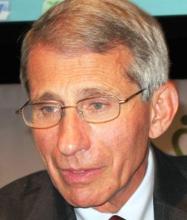A total of 11 new research grants have been awarded by the National Institutes of Health as part of the first year of funding for the Accelerating Medicines Partnership in Rheumatoid Arthritis and Lupus.
The $6 million in first-year funding, part of $41.6 million slated for the two autoimmune diseases over a 5-year period as part of the broader Accelerating Medicines Partnership in Rheumatoid Arthritis and Systemic Lupus Erythematosus (AMP RA/SLE) Program was announced Sept. 24.
Over 5 years, the AMP RA/Lupus Network will analyze the interplay among biologic pathways, including at the single cell level, in tissues of patients with RA and lupus. The goal is to integrate data from multiple genome-wide analytic approaches to generate a comprehensive understanding of the mechanisms of tissue damage in RA and lupus.
The AMP RA/SLE Program is funded by the National Institute of Arthritis and Musculoskeletal and Skin Diseases (NIAMS) and National Institute of Allergy and Infectious Diseases (NIAID), and the following members of the AMP: AbbVie, Bristol-Myers Squibb, Merck, Pfizer, Sanofi, Takeda, the Arthritis Foundation, the Lupus Foundation of America, the Lupus Research Institute/Alliance for Lupus Research, and the Rheumatology Research Foundation.
“To date, treatments for RA and lupus have been aimed at decreasing inflammation and pain,” Dr. Stephen I. Katz, director of NIAMS, said in a written statement. “For the first time, we are bringing together multidisciplinary research teams to achieve a broad, systems-level understanding of these diseases, setting the stage for the development of more effective diagnostic and treatment approaches.”
Dr. Anthony S. Fauci, director of NIAID, added: “This program promises to lead to more diagnosis and treatment options for rheumatoid arthritis and lupus. We also anticipate that the flexibility of the program will enable investigators to advance research on related diseases, thus improving our overall understanding of autoimmunity.”
In addition to the AMP RA/Lupus Network’s leadership center, led by Dr. Paul J. Utz of Stanford (Calif.) University and Dr. V. Michael Holers of the University of Colorado, Denver, the 11 grants were awarded to research teams at sites that perform clinical research, technology research, or both. For a list of the research sites and descriptions of the proposed research, click here.

